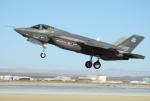
The Bulletin of the Atomic Scientists has published an article by Ian Stewart that draws on archival materials featured on this site. Since publication, the UK has announced that it will acquire F35As and join NATO nuclear sharing arrangements.
The United Kingdom’s Strategic Defence Review, published on June 2, announced a substantial investment of more than £15 billion (about $20 billion) in its nuclear forces. The review also opened the door to the deployment of air-launched tactical nuclear weapons by saying that the UK Ministry of Defence “should commence discussions with the United States and NATO on the potential… more
Eyes on the Clock: What Comes Next for Iran’s Nuclear Program

Dr Ian Stewart, 22 June 2025
The attacks by Israel and the US on Iran's nuclear program have disabled and perhaps destroyed key facilities. While the next few days are likely to be consumed with analysis of the attacks and a possible Iranian response, with potential for escalation, thought must also now be given to the next steps on the nuclear file. In particular, we must keep an eye on the clock ahead of key October deadlines for UN Security Council resolution snapback.
As things stand, the US and… more
Eyes on the Prize: Iran’s Highly Enriched Uranium Is Out of Control

Dr Ian J Stewart, 14 June 2025
Much is currently being written about the consequences of Israel’s military action in Iran. The conflict certainly carries monumental importance that deserves careful analysis. However, as of today, the 14th of June, only one thing matters and world attention should focus on this question: What’s happening with Iran’s 60% enriched uranium? Right now, more than 400 kgs of material – enough for perhaps 10 weapons – is outside of international oversight. Iran could convert this material into 90% HEU within a couple of days. Attention needs to focus on ensuring this material is not diverted to weapons use.… more
Part 1: the Khan Affair (1972-1979)

AQ Khan died on 10 October 2021 at the age of 85. Khan is an important figure in relation to proliferation and nonproliferation controls. This post does not seek to provide a biography or obituary to Khan. Instead, the post is the first of a series that will examine the role of AQ Khan drawing on primary source documents. This post provides a summary of a document obtained from the UK national archives, ‘URENCO and the AQ Khan affair’, which speaks to the Khan affair up to around October 1979. Images of this file are published alongside this piece. The file contains the recorded UK perspective on Khan’s employment at URENCO in the 1970s prior to his… more
Atoms, Sometimes for Peace: PhD Dissertation

In this post I wanted to provide some background on the research that led to the collection of the materials on this site. I started my PhD research after moving from the UK Ministry of Defence to King’s College London. My transfer to King’s College London built on my last role at the MOD in which I was responsible for assessment of exports and other forms of trade from a nonproliferation perspective. My main role at KCL was to be running something called Project Alpha, which was a new nonproliferation initiative through which to conduct research and outreach related to nonproliferation trade. This was already more than a full time role.
… more
